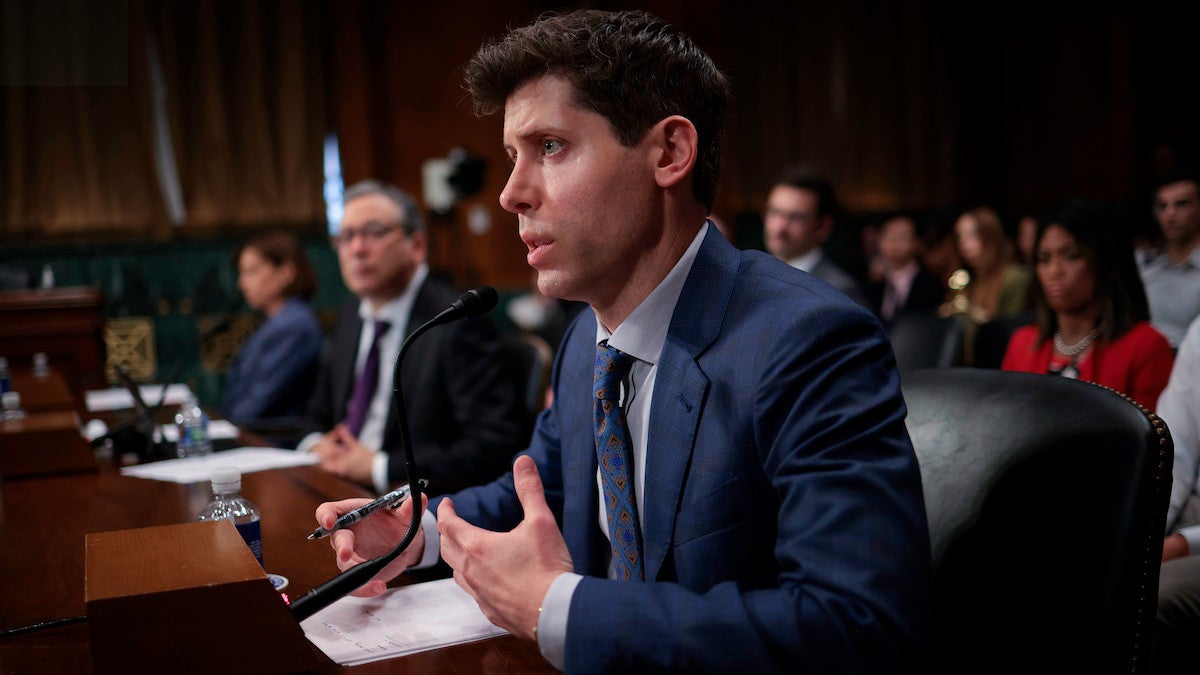OpenAI And ChatGPT: Under The FTC's Microscope

Table of Contents
FTC's Concerns Regarding Data Privacy and ChatGPT
The FTC's focus on data privacy in the age of AI is paramount. AI models, like ChatGPT, rely on vast amounts of data for training and operation. This raises concerns about how user data is collected, used, and protected. Potential violations involve the manner in which ChatGPT handles personal information, raising red flags regarding compliance with existing data privacy laws.
The FTC's investigation likely centers on several key areas:
- Data security breaches and vulnerabilities: The sheer volume of data processed by ChatGPT creates a larger attack surface, increasing the risk of data breaches and unauthorized access. Robust security measures are crucial to prevent such events.
- Compliance with existing data privacy laws (e.g., CCPA, GDPR): OpenAI must ensure ChatGPT's data handling practices comply with the California Consumer Privacy Act (CCPA), the General Data Protection Regulation (GDPR), and other relevant data protection laws worldwide. Non-compliance can lead to hefty fines and legal repercussions.
- Transparency in data usage policies: Users need clear and easily understandable information about how their data is collected, used, and shared by ChatGPT. Opaque data policies erode trust and raise serious concerns about potential misuse.
- Potential for discriminatory outcomes based on biased training data: AI models are trained on massive datasets, which may contain biases reflecting societal prejudices. This can lead to discriminatory outcomes if not addressed properly, prompting the FTC to scrutinize ChatGPT’s fairness and equity.
The FTC has a history of pursuing companies for data privacy violations; the investigation into OpenAI and ChatGPT echoes similar cases involving the mishandling of sensitive user information.
Potential for Misinformation and Malicious Use of ChatGPT
Beyond data privacy, the FTC is also concerned about the potential for misinformation and malicious use of ChatGPT. The ability of ChatGPT to generate human-quality text makes it a powerful tool, but this power can be easily misused.
The challenges are multifaceted:
- Deepfakes and synthetic media generated by ChatGPT: ChatGPT can be used to create realistic but fabricated videos, audio recordings, and text, leading to the spread of deepfakes and synthetic media capable of manipulating public opinion and damaging reputations.
- Spread of propaganda and disinformation: The ease of generating large volumes of convincing, yet false, content poses a significant threat to democratic processes and social stability. ChatGPT's capabilities could be exploited to spread propaganda and disinformation on a massive scale.
- Cybercrime facilitated by ChatGPT's capabilities: Malicious actors could leverage ChatGPT to generate phishing emails, create convincing social engineering schemes, or automate other cybercriminal activities.
- Lack of safeguards against misuse: The absence of robust safeguards and content moderation mechanisms increases the risk of malicious use, demanding a proactive approach from OpenAI and regulatory bodies.
These concerns fuel ongoing debates on AI ethics and responsible AI development, emphasizing the need for strong ethical guidelines and technical safeguards.
OpenAI's Compliance and Future Regulatory Landscape
OpenAI is actively working to address the FTC's concerns, implementing various safety and security measures. However, the potential for future regulations impacting OpenAI and the broader AI industry remains significant.
Key aspects to consider include:
- OpenAI's safety and security measures: OpenAI is investing in improving its models' safety and security, including implementing content filters and detection mechanisms to mitigate the risks of misinformation and malicious use.
- Proactive measures to prevent misuse of ChatGPT: OpenAI is actively exploring various methods to prevent misuse, such as developing more robust detection systems and collaborating with researchers and policymakers.
- Ongoing dialogue between OpenAI and regulatory bodies: OpenAI is engaged in an ongoing dialogue with regulatory bodies, including the FTC, to ensure transparency and address concerns proactively.
- Potential impact on future AI development and innovation: The regulatory landscape surrounding AI will significantly impact future AI development and innovation. Finding a balance between promoting innovation and mitigating risks is crucial.
The debate between self-regulation and government regulation remains central to this discussion. While self-regulation offers flexibility, government oversight ensures accountability and protects consumers.
Conclusion: The Future of OpenAI and ChatGPT Under Regulatory Scrutiny
The FTC's concerns regarding OpenAI and ChatGPT – encompassing data privacy, the potential for misinformation, and the risk of malicious use – highlight the critical need for responsible AI development and regulation. This scrutiny is not just about OpenAI; it sets a precedent for the entire AI industry. The future of AI hinges on navigating this complex regulatory landscape.
Follow the developments concerning OpenAI and ChatGPT, stay updated on the regulatory landscape surrounding OpenAI’s AI technologies, and learn more about the FTC's investigation into OpenAI and its impact on the future of AI. The ongoing dialogue between OpenAI and the FTC will shape the future of AI, impacting not just these specific technologies, but the entire landscape of artificial intelligence.

Featured Posts
-
 Sinners New Horror Movie Filmed In Louisiana Coming To Theaters
May 26, 2025
Sinners New Horror Movie Filmed In Louisiana Coming To Theaters
May 26, 2025 -
 Michael Schumachers Ferrari A Monaco Auction Highlight
May 26, 2025
Michael Schumachers Ferrari A Monaco Auction Highlight
May 26, 2025 -
 Klasemen Moto Gp 2025 Siapa Penantang Terkuat Marc Marquez
May 26, 2025
Klasemen Moto Gp 2025 Siapa Penantang Terkuat Marc Marquez
May 26, 2025 -
 Queen Wen Returns To Paris A Look At Her Court
May 26, 2025
Queen Wen Returns To Paris A Look At Her Court
May 26, 2025 -
 Jadwal Siaran Langsung Moto Gp Argentina 2025 Di Trans7 Saksikan Balapannya Di Sini
May 26, 2025
Jadwal Siaran Langsung Moto Gp Argentina 2025 Di Trans7 Saksikan Balapannya Di Sini
May 26, 2025
Latest Posts
-
 Nba Lifts Ban John Haliburton Returns To Pacers Games
May 28, 2025
Nba Lifts Ban John Haliburton Returns To Pacers Games
May 28, 2025 -
 Promo Samsung Galaxy S25 Ultra 1 To 1294 90 E
May 28, 2025
Promo Samsung Galaxy S25 Ultra 1 To 1294 90 E
May 28, 2025 -
 Achetez Le Samsung Galaxy S25 Ultra 1 To Moins Cher
May 28, 2025
Achetez Le Samsung Galaxy S25 Ultra 1 To Moins Cher
May 28, 2025 -
 Bon Plan Smartphone Samsung Galaxy S25 Ultra 1 To
May 28, 2025
Bon Plan Smartphone Samsung Galaxy S25 Ultra 1 To
May 28, 2025 -
 Offre Limitee Samsung Galaxy S25 Ultra 1 To A 13
May 28, 2025
Offre Limitee Samsung Galaxy S25 Ultra 1 To A 13
May 28, 2025
